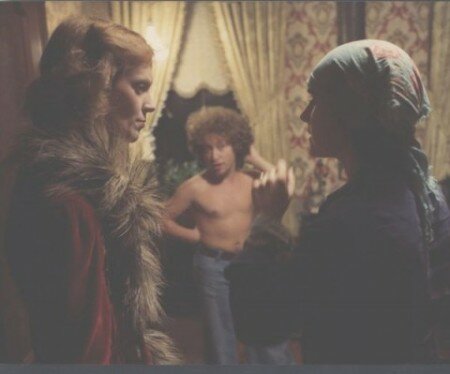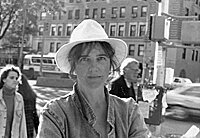Penny Allen, directing Lola Desmond and Cork Hubbert (born Carl Hubbert, in Pendleton) in Property.
Penny Allen wrote the following appreciation of Cork Hubbert after his death, in 2003.
Corky Hubbert
born Carl Hubbert
later known in L.A. as Cork Hubbert
Part One: Mirage
The show called Mirage was a biting musical, created and performed mostly at the Euphoria tavern during Corky’s early period, in 1974, when he was still living in Portland and was still known as Corky. I found Corky doing his own show, The Lola Desmond Story and recruited both him and Lola Desmond (a totally made-up name) for a new show. Mirage, amazingly enough, was a raucous singing satire of the Middle-East morass, with Egypt, Syria, Israel and Palestine duking it out. Inspired primarily by the Yom Kippur war beginning in October, 1973, Mirage put the leaders of numerous countries on trial and on stage with huge nametags on their fronts so the audience would know who they were.
The fact that very little has changed in Middle-Eastern politics since we wrote that show 30 years ago is not a promising thought–except that now, the terrorism on both the Israeli and Palestinian sides is more frequent and more efficient, but in Mirage, we already had the terrorism central and at least comically efficient, so we must have seen the future coming even then. The one thing that happened in our show that hasn’t happened in reality, or at least not yet, as I write this on October 6, 2003, was that in Mirage, a belly-dancing Israeli woman spy assassinated Arafat in his tent. Plot-wise, in Mirage, this seemed like the way to make the whole situation blow, which it did.
The fact that we succeeded in writing a truly funny show about such a subject was because of Corky Hubbert’s comic brilliance, exquisite sense of improvisation, capacity to imitate the famous, and unsurpassed adrenaline. We would identify a leader’s weakness, or tics, or the absurdity of his or her (Golda Meir) political stance, and Corky would fly with it. He had an ability to seize upon raw material and then synthesize seemingly everything he ever knew into a memorable comic insight. Corky’s most unforgettable piece in Mirage was when he played a threatening Colonel Muammar Khaddafi, the Libyan president transformed by Corky into a perfect imitation of Bob Dylan, circa Highway 61 Revisited, singing words he wrote himself: “Sleep With One Eye Open, Moshe Dayan,” the song went, and it was a show stopper. In case you’ve forgotten, Moshe Dayan only had one eye. The other was covered with a patch.
I never heard of anyone doing another show like Mirage until 1999, when some satirical group did a show in Cairo. I read about it in an article in the International Herald Tribune, which I sent to Corky. The article made the Cairo show sound like Mirage redux, only this time it was Arabs doing the satirizing, so the focus was no doubt different. As a show though, it was apparently maniacally comic and organized around one very funny, very short comic, just like Mirage. I couldn’t help thinking that some student from Egypt had been in Portland at Portland State University’s Middle-East Studies Center in 1974, and had seen our show. Then he went home and years later did something similar himself.
Bravo, Corky, for being so memorable.
Part Two: The Sisters Hotel
In 1985, Corky came up to Central Oregon for a visit to the ranch outside of Sisters where I was living. He came with Joe and Charlotte Uris, their daughters Rachel and Elisa, and David Horowitz. We went into town for lunch to the Sisters Hotel, which was an authentically old two-story wooden Old Western building with a boardwalk, high ceilings, and many little rooms upstairs along a hallway. Certain people in town enjoyed saying the Hotel used to be a whorehouse, but then people always enjoy saying that about some building in their town. Anyway, Sisters at the time was largely an undeveloped, straight, fundamentalist Christian, sincere, even innocent place.
Our gang sat down at a big table in the middle of the first floor restaurant, and we weren’t being particularly loud or unusual or raucous at all. The teen-age waitress came over to take our order, glanced around at us all open-faced, and then she fixed wide-eyed on Corky.
“Are you guys from the circus?”
The thing is, the waitress had asked her question in all innocence, no wit or irony intended, but Corky in particular was outside her scope, so she’d blurted out her thought. Without excluding the girl, Corky seized upon this choice raw material and riffed uproariously about innocence and the circus and correct behavior and being an outsider, getting funnier and funnier on everybody’s energy pouring in his direction. He had a subject going that he knew a lot about, and he wouldn’t let it go.
Corky grew up in a small Oregon beach town, so he was small-town himself, under the manic urban facade. And a relative, his grandfather I believe, had been a Pentecostal preacher, whose style of delivery Corky would later excel at. These past experiences were rich sources for Corky, who knew how better than anyone to take the small guy’s point of view and, when he was hot, transform it into Everyman’s.
Bravo, Corky, for being so smart.
Part Three: Ciao, Cork
I never saw Corky perform stand-up comedy in L.A. under the name of Cork. He changed his name to Cork when he went to L.A., because there was already another guy in Hollywood named Corky. Anyway, I never saw him doing stand-up comedy at The Comedy Store or other clubs, where he performed in the big-time L.A. comedy scene. People say he was brilliant, with his own great material, a rapid-fire socio-politically astute mind in a manically comic body, just as I will always remember him.
Too bad Corky and I–or Corky and somebody else–too bad we didn’t make that movie together, the one that would make him a star: Corky as a newsstand guy with a secret life, a life full of sexual passion, good works, and a tragedy that, try as he might, he doesn’t succeed in preventing. We threw ideas back and forth about this movie from time to time during the ’90s, when we saw each other in Portland, but we did not even come close to doing it.
So many people felt intense love for that man Corky. Nothing will ever fill up the holes in so many hearts. Nothing. Not even laughing like him. Or maybe laughing like Corky will help for a minute. He could laugh in so many different ways, all of them vaudevillian, most of them pretty villain:
Hehhhhhhhhhhhhhh.
Ho, ho, ho, from the stomach.
Heh, heh, heh, heh.
Nicker, nicker, in the bottom of the throat.
Haaaaaaaaaaaaaa, with head thrown back.
Others?
Everybody who knew him, you can remember how he laughed, you can still hear it… pull it up out of your memory… find it… think about it… hear it… and on the count of three, everybody laugh like Corky. One, two, three.
That’s better. Lots. Thanks. Since I got the news of Corky’s death, I’ve been walking around, laughing like him, unconsciously shouting his name out loud. CORKY! CORKY! And I’ve been pumping adrenaline like mad. CORKY, we’re all working together again!
Bravo, Corky, for teaching us so much.
Cork Hubbert as Brown Tom in Ridley Scott’s LEGEND (1985)




2 responses so far ↓
1 Bill Reinhardt // Feb 24, 2011 at 6:14 pm
Bravo and thanks for the well-written Cork reflection. It speaks for all of us who still miss him so much! His unique humor and lifestyle will provide us with many outrageous stories to share for a long time. He would be a great subject for a movie but a role impossible to fill.
2 Anne Richardson // Feb 24, 2011 at 6:23 pm
What a great idea! Thanks to Penny Allen for writing this appreciation, both as a friend of Cork and as a professional colleague.
Leave a Comment